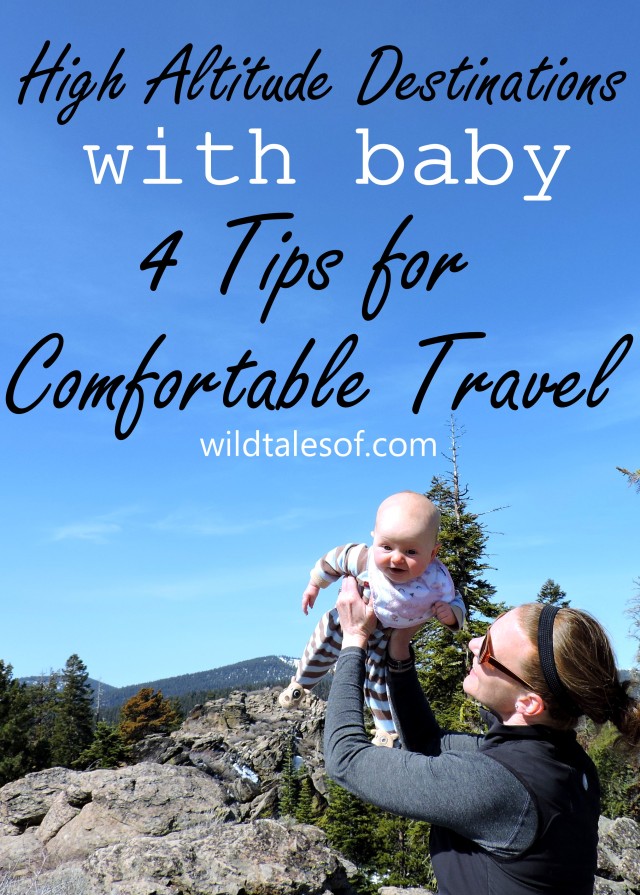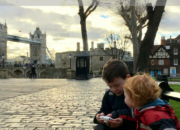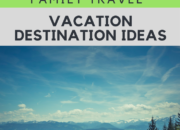When we road tripped from Seattle to Oregon and California, we traveled through more mountain passes than I could count or keep track of. One of our longer stays was also in the small mountain town of Truckee, California where the elevation is about 6,000 feet, a far cry from our usual comfortable and damp sea-level living.
We took a couple of things into consideration (and preparation) knowing we were traveling with our newest (now 4-month old) adventurer, and we also picked up a few tips and ideas along the way to make high altitude travel most comfortable for babies.

1. Be aware of changes in air pressure.
Changes in air pressure when flying is often discussed, but what about when driving? Do your ears pop when you drive over mountain passes? We hadn’t even considered it before our trip, but if our ears are uncomfortable, chances are, baby’s will be too. Georgia often fussed as we were climbing and descending, so we made sure to pop her pacifier in her mouth to encourage her to swallow and clear her ears. If your child doesn’t take a pacifier, you might consider giving them a bottle or stopping to nurse when you’ve reached a more stable elevation. Sometimes just knowing why the baby is upset is helpful even if you can’t help or solve the problem right away.
2. Hydration
Traveling to high elevations can be extremely dehydrating, so to counteract that, everyone needs to pump up their fluid intake. While in Truckee, I made sure to increase the amount of time Georgia nursed, and offered her “a meal” more often than usual. Easier said than done when traveling with young children, but its also especially important for nursing moms to watch their caffeine and alcohol consumption as both can lead to dehydration, and then effect milk simply.
3. Skin Protection
At higher elevations, those damaging ultraviolet rays are closer and more intense, so its hugely important to protect baby’s skin from sun damage and burns. We had hats for Georgia and always had the rest of her body covered, but I wish I had checked with her doctor before the trip. Sunscreen before the age of 6 months is not advised, but I later read that it can be okay if adequate shade and protective clothing isn’t available. Most of the time she was completely fine (indoors or tucked into the ergo with the sun hood out), but I wish I’d known about the sunscreen option for when were reached Picnic Rock during our hike on the Tahoe Rim Trail. Would have, possibly, given me a little more peace of mind. Block Island Organics makes an excellent mineral sunscreen that’s gentle and safe for babies.
4. Baby Noses
When I travel to high altitude destinations, as well as desert areas like Phoenix, all parts of me tend to get dried out. My skin is thirsting for moisture and my hair is full of static, but the most notable difference is my nose. It gets dry and flaky, and can even bleed a little bit. This is all uncomfortable, but something I can handle as a grown adult. Babies and young children? Not so much. Increasing the fluids helps, but we also pack (or pick up when we arrive–thanks to Grandma) baby saline to moisturize the nasal passages. The added moisture helps clear Georgia’s dry, stuffed up nose, and was especially important before bed.
Do you bring along anything extra when traveling to higher altitudes? What are your best tips?
Affiliate links to Amazon are included in this post to give you an idea of a couple of the tools we use when traveling.
Come join the conversation! We’d love to have you join us on all of our adventures by “liking” our facebook page and following us on twitter! You can also keep up to date with each and every post by subscribing to the blog via email.
 Travel with Young Children: It DOES Get Easier!
Travel with Young Children: It DOES Get Easier! Family Travel Destination Ideas: Where the Experts are Vacationing in 2018
Family Travel Destination Ideas: Where the Experts are Vacationing in 2018 14 Family Travel Destination Ideas: Where the Experts are Vacationing in 2017
14 Family Travel Destination Ideas: Where the Experts are Vacationing in 2017 2016 Gift Guide for the Travel and Outdoor Loving Dad
2016 Gift Guide for the Travel and Outdoor Loving Dad
We’ve taken the kids up to 14-15000 after acclimatisation at 10000 feet and even 17000 feet. Thumbsucking helps with pressure change, so does sucking hard candies. Even giving them a drink so they are forced to swallow and equalize pressure.
I second the idea of large brimmed hats.
Great piece.
Thanks, Paul! Really appreciate you adding those tips for tackling high altitude with kids past the baby stage! Thumbsucking for the the win, huh? 🙂
I have never thought of this outside of an airplane! I am so glad you wrote this post. I don’t know if we are going anywhere that has a high altitude… but since we live at sea level even a slight increase I am sure could cause some of these issues. 🙂
Thanks, Jenny! We didn’t really think about it either until this trip with all the mountain passes. Definitely a reason to embrace the pacifier (for a baby) since we were cursing it days earlier as she woke up every hour in the night screaming for it! 😉
aw, poor baby 🙁 I am sure your post will help many parents.
These are great ideas! Living in Colorado, it’s extremely important for parents to take small children into consideration when travelling to higher altitude destinations. You also want to make sure you keep your baby warm so bring plenty of extra layers in case of a sudden decrease in temperature!
Thanks, Lora! And I appreciate you adding that advice about keeping babies warm in layers–oh so important as well.
Great tips, Kate! We are heading to a wedding in Colorado in June at 8,500 feet and I want to make sure the babe is comfortable.
You’re welcome, Molly! That is some serious altitude. I’m heard acclimating gradually (which I think you might already have planned) helps too. Let me know if you find anything else to be helpful & maybe we can add to the list!
Thanks for these tips! May I ask how old your daughter was when you took this trip? We are moving to Colorado from DC with our two month old and I’m not sure how his age might factor into our plans. Thanks!
Hi Kristin! I’m glad you found the tips helpful. Yes–our daughter was 4 months old when we took this particular trip, so I think all of the suggestions would definitely apply. DC to Colorado is a big change–good luck with the move & let me know if I can help with other questions.
Great article and tips. She looks very happy in the picture! The best tip I had is: always give water to them, it makes them hydrated. Taking babies for an adventure is also an adventure and a nice one 😀
Our family is getting ready to go on a trip. Our youngest will be about 1 y.o. then. One night’s sleep stop is planned to be at 11,000. I’m a little nervous about this. Do any of you have experience with kids sleeping at this type of altitude?
Hi Kami–thanks so much for stopping by the blog–we haven’t actually slept in a spot that high, but have done a day trip to about that high when we were in Montana/Wyoming. I seemed to be the one most effected! The kids (at the time they were 8 months old & almost 4years old) did really well. My advice is to take it easy, and make sure to stay very very hydrated. If you are able to gradually acclimate at all, such as staying at a lower elevation (5 or 6,000) first, I’d also suggest that. Safe travels!
How did it go with the baby? Any tips for my 1 yo traveling this December? Thanks!
Researching the altitude change with a little one and came upon your blog . It’s making me feel better already. We’ll be flying toDenver from Philadelphia pa, and staying in Boulder Co with our 15 month old. Hoping to visit Rocky Mountain national park when there. The altitude change was worrying me, but your post is making me feel better already! Good to feel prepared with these tips. Of course we want our little guy to enjoy this adventure! Thanks!
Thanks so much for your comment, Vikki! I hope these tips help–I’m sure your little guy will do great! Have a great trip! We love Boulder–definitely a fun destination.
THank you so much for the tips! I grew up in Tahoe but moved to the south and had my LO there. We are heading to Tahoe next week to visit Grandma and it didn’t even cross my mind that the higher elevation could affect my 9 month old. These tips are great though so thank you!!
You’re welcome, Bonny! I hope you have a great visit–we can’t wait to get back to the Tahoe area for a visit.
My daughter plans to commute off the 5000 high altitude mountain to work daily with her newborn. She has not considered the effects of babies’s ears and the extreme changing altitude and traveling this route 5-6 days a week. What is your advice?
Hi June–Thanks for stopping by the blog! I would have her read through and follow the advice here in the post, especially the hydration aspects, and the air pressure changes (make sure shes ready with pacifiers or takes a break to give a bottle/breastfeed). I’m sure with doing the commute that frequently, she’ll develop a routine that works best for her and the baby. Also read through the rest of the comments here, there are many nuggets of advice from fellow readers. I really hope that helps! -Kate
Hi! What if your baby is sleeping during the elevation changes? He doesn’t seem bothered and has been doing well. Do I need to wake him when my ears are popping? He still feeds about every 2-3 hours at least for hydration..thank you!
Hi Megan,
Nope, I would just leave them be, and follow the old saying, “Never wake a sleeping baby” 😉
-Kate